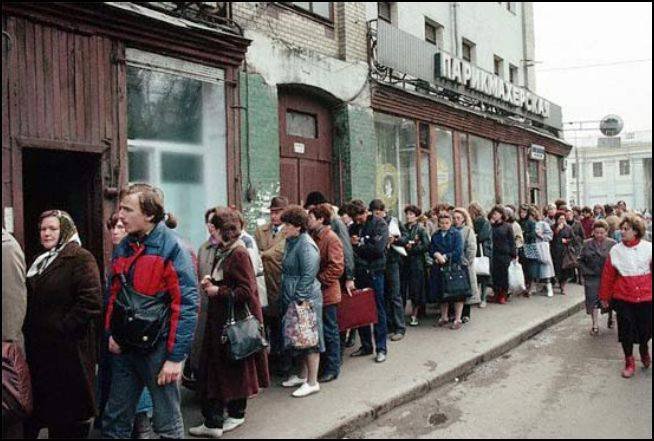
Consumerism in the Soviet Union began with Stalin's third five-year plan to expand the access to consumer goods by creating an industry to help support the growing demand by Soviet citizens. This idea was only on paper though due to the buildup of the arms industry because of the German invasion of the Soviet Union. A bulk of consumerism was brought first by the Khrushchev Thaw that lifted censorship to a degree and allowed foreign ideas to come into the Soviet Union, then by the ninth year plan, that wanted to increase commercial industry, focusing more on the quality of life of the Soviet people over an increase in the heavy industry.
The Khrushchev Thaw started the process of opening the minds of the Soviet people to the ideas and products from outside the communist world.With less restriction on freedom of thought, and less restriction on foreign media, it gave the Soviet people a taste of what consumerism luxuries that lived beyond their long lines for food, and also gave rise to artists and authors that would spread new ways of thinking to the Soviet people, making consumerism and capitalism look more appealing. With the introduction of films and sports into Soviet society, it shifted to a mindset where people want to work hard to be able to achieve personal gains, in contrast to Davies experience of the pre-world war two Soviet union were workers would work hard to make the quota so the entire factory could benefit. Many foreign ideas entered the Soviet Union, mostly in forms of mass media like the Amerika magazine and the American National Expo, which expanded individualistic capitalist ideas to the Soviet population, especially the Soviet youth.
The ninth five-year plan was brought forth in Brezhnev’s tenure as leader of the Soviet Union in 1971. It sought to help the average Soviet citizen acquire a better life by starting and increasing production of fridges, makeup, or even televisions. The growth of consumer demand was lower than the industrial output even after the 5 year plan expanded the consumer goods industry, which led many citizens of the Soviet Union to doubt the benefits of living in a socialist society.